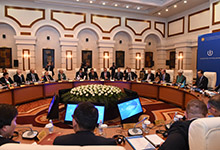
Typical street scene in Santa Ana, El Salvador. (Photo: iStock)
IMF Survey : New Economic Challenges Ahead for Caucasus, Central Asia
June 7, 2016
- 25th anniversary of independence of eight former Soviet countries marks many achievements
- Lower commodity prices, regional slowdown challenge old thinking
- Regional roundtable focuses on ways to diversify economies, modernize monetary and fiscal frameworks
Following a period of rapid growth, the 25th anniversary of independence for the Caucasus and Central Asia (CCA) region comes at a time of economic challenges.

IMF Managing Director Christine Lagarde participates in a high-level regional roundtable in Astana, Kazakhstan on new economic challenges facing the region (photo: Isturgan Aldauyev)
Regional Roundtable
The decline in oil prices and the economic slowdown in China, Russia, and Europe will have a long lasting impact on the region.
The first regional roundtable, held in Astana, Kazakhstan on May 24 and jointly chaired by IMF Managing Director Christine Lagarde and Kazakhstan’s Prime Minister Karim Massimov, was a platform to deepen the regional dialogue on the way forward. CCA countries have enjoyed average growth rates of nearly 7 percent during the last decade. But growth is expected to slow down to 3.5 percent in the medium term according to IMF projections.
Throughout the roundtable discussion, finance ministers from the region plus Russia and Belarus, along with IMF experts agreed that now is the time to diversify away from commodity dependence, strengthen institutions, and promote regional integration to address these challenges. Key questions discussed throughout the day’s events were:
• Can more trade within the region and between Europe and Asia help, and how to achieve it?
• What to make of initiatives like “One Belt, One Road,” which is a transport corridor between Europe and Asia?
• When is monetary policy action such as allowing sharp exchange rate adjustments appropriate?
• How to find the right balance in fiscal policy between supporting growth in the short term and maintaining medium-term sustainability?
Many of the issues debated at the roundtable extended to panel discussions at the subsequent Astana Economic Forum held later in the week.
Reviving the old Silk Road
Participants in the roundtable and the forum agreed that in the face of commodity prices that are likely to remain low for long, the region can no longer rely on oil, gas, and mining. Diversification into trade and logistics holds most promise, the experts agreed. One important area is increasing intra-regional trade which, at just 6 percent of total trade, stands at the lowest share in Asia.
The CCA region’s greatest opportunity, however, lies in serving as a transport link between Europe, China, India, and South Asia. Reviving the ancient Silk Road through the “One Belt, One Road” project initiated by China, is seen as a big opportunity.
Central Asia region can increasingly serve as a bridge between Europe and China. “Even so, actions will need to go further if the region is to become a hub for new goods and services along the way. This means modern, efficient and low cost transportation and logistics services,” Lagarde said at a speech at Nazarbaev University in Astana. Her view was echoed by many experts at the panel discussions such as professors Jeffrey Sachs from Columbia University and Erik Berglof from the London School of Economics.
Moving toward more flexible exchange rates
Responding to lower foreign currency inflows from commodity exports or remittances, a number of CCA countries such as Kazakhstan, Azerbaijan, and Tajikistan recently adopted more flexible exchange rates. This helped to regain competitiveness and preserve currency reserves, but also increased inflation and put pressures on borrowers in foreign currency, and hence the financial sector.
To address these side effects, experts called for modernizing monetary policy frameworks, including a clear mandate for the central bank to pursue price stability, a strengthening of the tools and practices to support this mandate, and better communication. In the financial sector, bank supervision should be enhanced, together with measures to enhance liquidity, provisioning and capital.
While IMF staff supported more flexible exchange rates, they also stressed that pace and modalities need to be adapted to country circumstances. A recent IMF report Exchange Rate Developments and Policies in the Caucasus and Central Asia lays out the considerations and was discussed at a high-level panel at the forum in Astana moderated by Masood Ahmed, Director of the IMF’s Middle East and Central Asia Department.
Better fiscal frameworks are key
Another key issue identified at the regional event and at the Astana Economic Forum was the importance of strong fiscal policies and institutions. “Fiscal policy may smooth the impact of shocks, where buffers allow and where spending is efficient or tax measures are well targeted,” noted lead author of the IMF report Mark Horton, during the economic forum.
In the medium term, however, budget consolidation was needed to keep public debt from increasing, and sustain buffers. In any event, social spending needs to be protected and public investment should focus on areas that support diversification, such as transport infrastructure and new technologies.
To improve fiscal policy making, Lagarde also stressed the importance of consolidated and transparent fiscal frameworks—covering not only the state budget but also local governments, state companies, and non-budgetary funds. Better financial management and fiscal accounting are key to improve accountability and counter perceptions of corruption, she argued.


